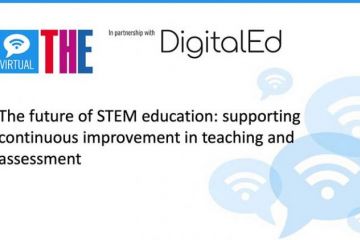Exams system 'near collapse'
The exam system is near to collapse and must be overhauled, the new head of the troubled qualifications watchdog warned yesterday. Ken Boston, the Australian who arrived to run the Qualifications and Curriculum Authority at the height of the A-level fiasco, said the system needed more independence from government. (Telegraph, Times, Independent)
Medical students shortage warning
Medical schools may soon be unable to recruit the numbers of students they need, a study by the Department of Health has concluded. Failure to fill a 58 per cent expansion in places by 2005 would be a blow to the government’s 10-year plan to increase doctor numbers and National Health Service capacity. (Financial Times)
Frogs discovery raises hope for more species
Scientists have identified more than 100 new species of frogs inhabiting a small and threatened patch of tropical rainforest in a discovery that underscores our ignorance of the natural world’s diversity. An international team of biologists led by Christopher Schneider of Boston University, in the US, describes up to 140 new frog species they found in a survey of Sri Lankan rainforests, published today in Science . The discovery adds weight to the theory that there are many more than the 1.7 million species of animals and plant life known to science – possibly 10 million or more. (Independent)
Holocaust survivor wins Nobel prize for literature
The £639,000 Nobel prize for literature has gone to a Hungarian-Jewish former concentration camp inmate whose novels resolutely refuse to portray the Holocaust -or life in general – as a moral issue. The works of Imre Kertesz show Hitler’s extermination of more than six million Jews and others as a world in which “both perpetrators and victims were preoccupied with insistent practical problems”. (Guardian, Times, Independent, Financial Times)
BAT sorry for offer to sponsor student
British American Tobacco has apologised for offering to sponsor a student at the London School of Hygiene and Tropical Medicine, which has a policy of not accepting money from tobacco companies. The company admitted it should never have invited academics to suggest candidates for the £1,500 support and the promise of a graduate job. (Guardian)
Gene therapy hope for Parkinson’s disease
Researchers in the US are to treat Parkinson’s disease sufferers with gene therapy for the first time, it was announced last night. The experimental treatment follows publication in the journal Science of a successful trial in rats. (Guardian, Financial Times)
Babies at risk from teething diagnosis
Irritable crying, cold-like snuffling and bright red cheeks are not signs of a teething baby in spite of what doctors may say, according to research published in the British Medical Journal. Health professionals may be putting babies at risk by ascribing potentially serious and fatal illnesses to teething, says the study conducted by researchers at the Royal Children’s Hospital in Parkville, Victoria, Australia. (Guardian)
Publish and be damned
The latest literary row between Professor Orlando Figes and the Times Literary Supplement shows that years spent researching a major piece of work can be undone by a single review. Professor Figes’s work Natasha’s Dance: A Cultural History of Russia was heavily criticised in the TLS by reviewer Rachel Polonsky. (Guardian)
Frozen baby egg hailed as fertility milestone
A fertility doctor yesterday hailed the imminent arrival of a world in which women could cap a successful career with mature motherhood, following the birth of a baby girl to a woman whose eggs had been removed and kept frozen until she needed them to conceive. Egg freezing, said Gillian Lockwood of Midland Fertility Services, “may come to be seen as the ultimate kind of family planning”. (Guardian, Daily Mail)
Lack of women scientists is damaging Britain
Half the insights, half the results and half the solutions – women are deserting science in droves and science is suffering as a result. Female students at university are favouring subjects such as media studies and those who do study science often reject it as a career option. (Guardian)
Overcrowding forces students to share rooms
Universities are blaming the lack of accommodation that is forcing new undergraduates to share rooms on the massive intake of students caused by A-level downgrading. (Telegraph)
Former Cambridge college principal dies
Alison Shrubsole, the educationalist who was principal of Homerton College, Cambridge from 1971 to 1985 has died at the age of 77. (Telegraph)
Advice to literary hopefuls at university
Former Cambridge graduate Terence Blacker ponders a request to writers from the editor of Varsity magazine asking for a short piece detailing how their time at university inspired them. (Independent)
Dusty disk may be new planet
The search for planets outside our solar system – one of the most frenetic fields of astronomy – took a new turn yesterday when an international research team reported the discovery of a huge distorted disk of dust around Fomalhaut, one of the brightest stars in the night sky. Astronomers from Britain and the US used the James Clerk Maxwell Telescope in Hawaii to examine the disk. (Financial Times)
Self-centred young strive to succeed
Young people have developed a “me, me, me” attitude to help them fulfil their often unrealistic ambitions, a survey reveals. Research commissioned by the media consortium Right of Admission Reserved found that today’s teens and twenties have been forced to grow up more quickly and to become self-reliant faster than previous generations. (Daily Mail)
Register to continue
Why register?
- Registration is free and only takes a moment
- Once registered, you can read 3 articles a month
- Sign up for our newsletter
Subscribe
Or subscribe for unlimited access to:
- Unlimited access to news, views, insights & reviews
- Digital editions
- Digital access to THE’s university and college rankings analysis
Already registered or a current subscriber?







